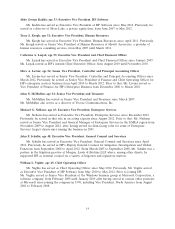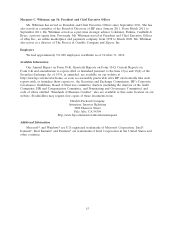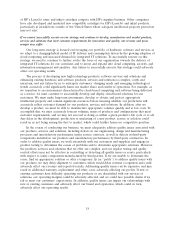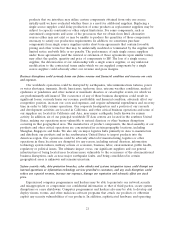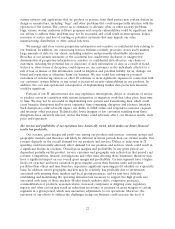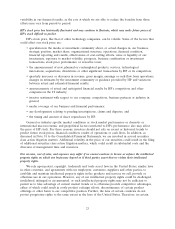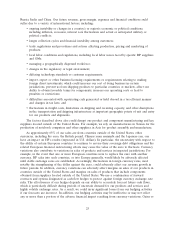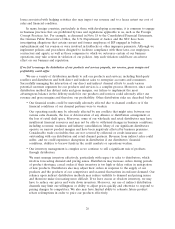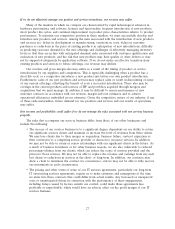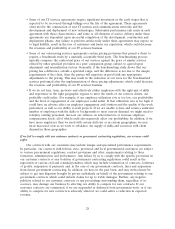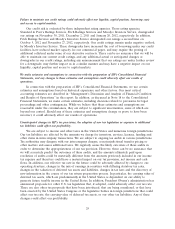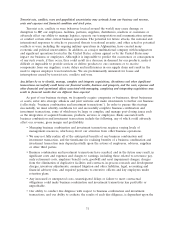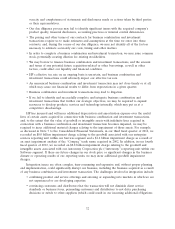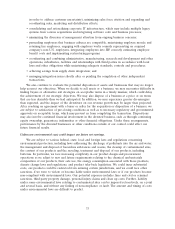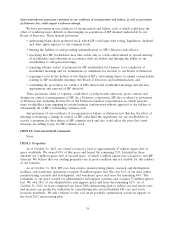HP 2012 Annual Report Download - page 32
Download and view the complete annual report
Please find page 32 of the 2012 HP annual report below. You can navigate through the pages in the report by either clicking on the pages listed below, or by using the keyword search tool below to find specific information within the annual report.jurisdictions we may be unable to protect our proprietary technology adequately against unauthorized
third-party copying or use; this, too, could adversely affect our competitive position.
Because of the rapid pace of technological change in the information technology industry, much of
our business and many of our products rely on key technologies developed or licensed by third parties.
We may not be able to obtain or continue to obtain licenses and technologies from these third parties
at all or on reasonable terms, or such third parties may demand cross-licenses to our intellectual
property. In addition, it is possible that as a consequence of a merger or acquisition, third parties may
obtain licenses to some of our intellectual property rights or our business may be subject to certain
restrictions that were not in place prior to the transaction. Consequently, we may lose a competitive
advantage with respect to these intellectual property rights or we may be required to enter into costly
arrangements in order to terminate or limit these rights.
Third parties also may claim that we or customers indemnified by us are infringing upon their
intellectual property rights. For example, individuals and groups frequently purchase intellectual
property assets for the purpose of asserting claims of infringement and attempting to extract
settlements from companies such as HP and their customers. The number of these claims has increased
significantly in recent periods and may continue to increase in the future. If we cannot or do not
license infringed intellectual property at all or on reasonable terms, or if we are required to substitute
similar technology from another source, our operations could be adversely affected. Even if we believe
that intellectual property claims are without merit, they can be time-consuming and costly to defend
against and may divert management’s attention and resources away from our business. Claims of
intellectual property infringement also might require us to redesign affected products, enter into costly
settlement or license agreements, pay costly damage awards, or face a temporary or permanent
injunction prohibiting us from importing, marketing or selling certain of our products. Even if we have
an agreement to indemnify us against such costs, the indemnifying party may be unable or unwilling to
uphold its contractual obligations to us.
Finally, our results of operations and cash flows have been and could continue to be affected in
certain periods and on an ongoing basis by the imposition, accrual and payment of copyright levies or
similar fees. In certain countries (primarily in Europe), proceedings are ongoing or have been
concluded involving HP in which groups representing copyright owners have sought to impose upon
and collect from HP levies upon equipment (such as PCs, MFDs and printers) alleged to be copying
devices under applicable laws. Other such groups have also sought to modify existing levy schemes to
increase the amount of the levies that can be collected from HP. Other countries that have not imposed
levies on these types of devices are expected to extend existing levy schemes, and countries that do not
currently have levy schemes may decide to impose copyright levies on these types of devices. The total
amount of the copyright levies will depend on the types of products determined to be subject to the
levy, the number of units of those products sold during the period covered by the levy, and the per unit
fee for each type of product, all of which are affected by several factors, including the outcome of
ongoing litigation involving HP and other industry participants and possible action by the legislative
bodies in the applicable countries, and could be substantial. Consequently, the ultimate impact of these
copyright levies or similar fees, and the ability of HP to recover such amounts through increased prices,
remains uncertain.
Due to the international nature of our business, political or economic changes or other factors could harm
our future revenue, costs and expenses and financial condition.
Sales outside the United States make up approximately 65% of our net revenue. In addition, an
increasing portion of our business activity is being conducted in emerging markets, including Brazil,
24


